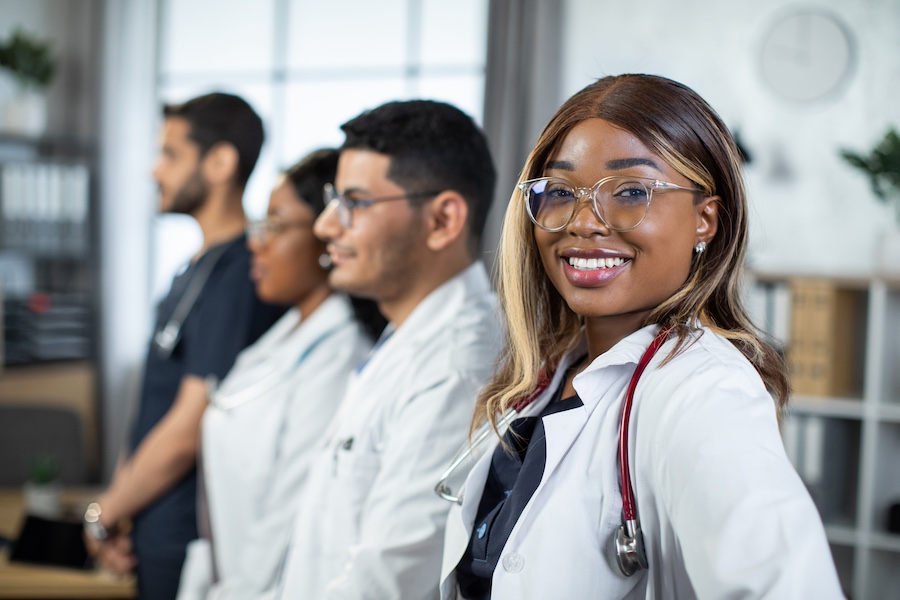When applying to medical school, the most important question is, of course, which schools you’re going to apply to. Just as when building a list of colleges to apply to as an undergrad, you will need to research schools, and determine which best suit your needs as a student and potential doctor.
In this article, we’re going to cover how to build a list of medical schools. We’ll discuss how many schools you should apply to, researching and evaluating schools, and deciding which schools you actually should apply to. Let’s get started!
How Many Medical Schools Should You Apply To
The average number of medical schools students apply to is 16. There are good reasons for this; only around 40% of medical school applicants are admitted in any given application cycle, and there is a reasonable belief that applying to more schools increases your chances of getting in somewhere.
That said, applying to too many schools reduces the quality of each application, as you spread yourself thin across ever more essays and interviews. Your goal is to find the right balance; you want enough schools on your list to mitigate risk, while not so many that you are unable to give the needed attention to each.
Our general recommendation is to aim for the high end of average, applying to 15-20 medical schools. Since many schools repeat similar prompts, you can then add additional schools to this list once you finish these applications. We recommend reusing materials wherever possible in this process; working smarter is the best way to save your time and sanity.
How aggressive you are with your schools should also impact your list. We do not recommend only applying to top schools; the bulk of your list should be dictated by your stats (more on this in the next section). If you are applying to more competitive schools, you may want to increase the overall size of your list to help mitigate the lower acceptance rates these schools have. Medical schools cannot see where else you are applying, or even how many schools you apply to.
There is a cost associated with medical school applications, and this can be quite steep for some students. Luckily, both AMCAS and AACOMAS have fee assistance programs. These must be applied for, but this is not onerous. Note that Texas’ application system, TMDSAS, does not have a fee waiver.
Choosing What Schools to Apply To
There are many many factors to consider when deciding which medical schools you should apply to, and we will cover each of them. The most important factors for your own choices will vary, but note that not every medical school will be a perfect fit for you. You will need to embrace the spirit of compromise, and add schools to your list that are just okay. We will discuss this more later on as well.
Factor One: Your Admission Stats
The two most important factors for your admission to medical school are your GPA and MCAT scores. These won’t get you in on their own, but can definitely get you rejected. You must pass a school’s benchmarks with your averages to consider it a reasonable choice for your list.
For your convenience, the AAMC has the Medical School Admission Requirements database (MSAR), which lists the median GPA and MCAT score for entering classes at every medical school associated with the AAMC. You should compare these with your own scores to determine whether schools are target, reach, or safety for you.
For target schools, your GPA should be within .1 of the median, and your MCAT within 2 points. Reach schools are ones where your GPA is .2 or more below the median, or your MCAT 3 or more points below. Safe schools are ones where your GPA is .2 or more above median, or your MCAT is 3 or more points higher.
Note that unlike college admissions, there are no true safety schools. Your essays, activities, and interviews always matter, and you cannot get in on the strength of your scores alone. That said, having scores in these ranges gives a reasonable ballpark for determining whether a medical school is a realistic prospect for you.
We recommend you primarily apply to schools in the target range, with a few reach schools thrown in. Applying primarily to reach schools makes your task more difficult, and means you should add more schools to your list overall to mitigate the risk. We recommend doing this after applying to target schools.
Factor Two: Location
Even within the score ranges you have, there are going to be many potential schools, which means you will need to start considering what you want from a medical school. One major factor is location, as this can also impact where you end up working later, and the costs associated with medical school.
The first thing to note is that acceptance rates are slightly higher for local students. This is because many medical schools, especially ones connected with public universities, want students who will stay in the area and serve the local community.
Note that some locations are also more popular than others. New York and California see the most medical school applicants by far, and more rural locations tend to see the least. This is even more true for residencies, where rural locations tend to be by far the least popular.
The direct and associated costs of attending medical school also vary by location. Public schools often have lower tuition for in-state students, which can save you tens of thousands of dollars over the course of medical school. The cost of living in a certain area can also vary greatly; New York is more expensive to rent apartments and pay for groceries than Cleveland.
All location choices involve trade-offs; and you should decide what compromises you are willing to make when building your list. These will be personal to you, but can add or remove entire swathes of schools from consideration.
Factor Three: Fit
All medical schools do generally the same thing: they prepare you to be a doctor. That said, each is also distinct, with its own culture, traditions, and values. Fit is something these schools consider carefully when making their admissions decisions, and it is something you should consider when deciding where to apply.
Fit is a somewhat nebulous term, because there is no single thing that causes it. It is more of a feeling than a demonstrable trait. That said, it is still incredibly important for these schools, and also for your own applications. These are things that come up in your essays and interviews, and show you are what the school needs.
Here are some examples of what fit looks like:
- Living or growing up near the medical school, and being part of the community it regularly serves.
- Having a record of working with populations that the school works with. This is especially true for schools with a heavy service orientation, who like seeing volunteering in applicants.
- Having skills relevant to the school, such as being fluent in Spanish for a school which serves a large hispanic community.
These are all more minor factors on their own, but worth considering when researching schools and adding them to your list. Your in-state and regional schools are usually your best bet here, and we advise having all of them on your list if your scores line up with their averages.
There are of course other things you can consider when deciding whether or not a school belongs on your list, but these are the main ones, in the order of importance for consideration.
Final Thoughts
Medical school applications are very competitive, which is partly because students need to apply to so many schools. In some ways this is self-fulfilling, but there really are many more students who want to attend medical school than there are seats. For this reason, it is of paramount importance to build your list well, and to make sure that the schools you are applying to maximize your chances of attending a great medical school.
We hope that this article has given you the guidance you need to get started. Of course, every situation is different, with individual concerns and questions. If you want to talk to an expert, and learn how we can help you with your journey, schedule a free consultation today. We’re always happy to hear from you.








